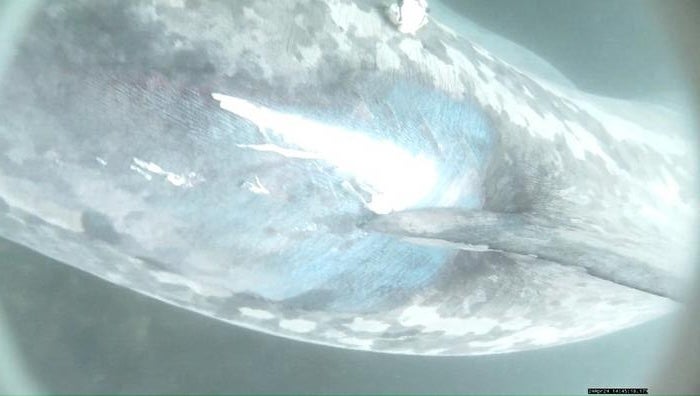World first footage shows endangered shark struck by boat just hours after being tagged
The shark never resumed feeding or other normal behavior after the collision, researchers say
Your support helps us to tell the story
From reproductive rights to climate change to Big Tech, The Independent is on the ground when the story is developing. Whether it's investigating the financials of Elon Musk's pro-Trump PAC or producing our latest documentary, 'The A Word', which shines a light on the American women fighting for reproductive rights, we know how important it is to parse out the facts from the messaging.
At such a critical moment in US history, we need reporters on the ground. Your donation allows us to keep sending journalists to speak to both sides of the story.
The Independent is trusted by Americans across the entire political spectrum. And unlike many other quality news outlets, we choose not to lock Americans out of our reporting and analysis with paywalls. We believe quality journalism should be available to everyone, paid for by those who can afford it.
Your support makes all the difference.Scientists have captured the first ever video of a basking shark struck by a boat just hours after it was tagged off the coast of Ireland, a discovery that raises concerns of collision risks faced by endangered marine animals.
A female basking shark, about 7m long, was tagged with a device similar to a FitBit and a connected camera was designed to be released from the animal at a predetermined time.
With the tag being released about seven hours after the strike and later retrieved, researchers found that the shark never resumed feeding or other normal behavior after the collision.
It is unclear whether the shark eventually recovered from the strike, scientists from Oregon State University in the US say.
The findings, published in the journal Frontiers in Marine Science, show the risk of vessel strikes on marine animals and the need for measures to counter this threat.
“The shark was struck while feeding on the surface of the water and it immediately swam to the seafloor into deeper, offshore waters, a stark contrast to its behavior prior to the strike,” study co-author Taylor Chapple said.
“This is the first ever direct observation of a ship strike on any marine megafauna that we’re aware of,” Dr Chapple said.
Ireland is one of the only known locations where the endangered basking sharks continue to aggregate in large numbers.
The species, which can grow up to about 8m in length, feeds on small organisms on the water’s surface similar to some whales, making them susceptible to boat strikes.
But unlike whales, basking sharks sink after collision, making it difficult to ascertain the true impact of boat strikes.
To overcome this hurdle, researchers tagged a basking shark with an activity monitoring system as it was feeding, and followed it from a safe distance for a few hours.
After the tag released itself from the animal as designed, researchers located it and recovered the data.
Scientists found that for several hours after the tagging, the shark spent most of its time feeding on the surface with occasional dives.
They also found recording of the shark attempting to make a quick evasive movement as the keel of a boat cut across its back just behind its dorsal fin.
It then dived through the water and headed to the ocean floor, researchers say.
Video from the tagged camera showed the shark suffering visible damage to its skin with paint marks and a red abrasion, but with no open wound or signs it was bleeding.

While boat strikes are not always deadly to sharks, even non-lethal injuries can have short- and long-term consequences for affected animals, scientists said.
“The fact that a shark we fitted our ‘Fitbit’ to was struck in this area within a few hours underlines just how vulnerable these animals are to boats and highlights the need for greater education in how to mitigate against such strikes,” Nicholas Payne, another author of the study, said.
Researchers call for further studies to understand how often basking sharks feed on the water’s surface when they are not clearly visible.
“Addressing such questions will be critical to informing not only our ecological understanding of the basking shark, but also the conservation of this globally endangered species,” Alexandra McInturf, another author of the study, said.

Join our commenting forum
Join thought-provoking conversations, follow other Independent readers and see their replies
Comments